- Home
- Oliver Sacks
On the Move: A Life
On the Move: A Life Read online
ALSO BY OLIVER SACKS
Migraine
Awakenings
A Leg to Stand On
The Man Who Mistook His Wife for a Hat
Seeing Voices
An Anthropologist on Mars
The Island of the Colorblind
Uncle Tungsten
Oaxaca Journal
Musicophilia
The Mind’s Eye
Hallucinations
THIS IS A BORZOI BOOK
PUBLISHED BY ALFRED A. KNOPF AND ALFRED A. KNOPF CANADA
COPYRIGHT © 2015 BY OLIVER SACKS
ALL RIGHTS RESERVED. PUBLISHED IN THE UNITED STATES BY ALFRED A. KNOPF, A DIVISION OF PENGUIN RANDOM HOUSE LLC, NEW YORK, AND IN CANADA BY ALFRED A. KNOPF CANADA, A DIVISION OF PENGUIN RANDOM HOUSE LTD., TORONTO, PENGUIN RANDOM HOUSE COMPANIES.
WWW.AAKNOPF.COM
WWW.PENGUINRANDOMHOUSE.CA
WWW.OLIVERSACKS.COM
KNOPF, BORZOI BOOKS, AND THE COLOPHON ARE REGISTERED TRADEMARKS OF PENGUIN RANDOM HOUSE LLC.
KNOPF CANADA AND COLOPHON ARE TRADEMARKS OF PENGUIN RANDOM HOUSE LTD.
LIBRARY OF CONGRESS CATALOGING-IN-PUBLICATION DATA
SACKS, OLIVER W.
ON THE MOVE : A LIFE / BY OLIVER SACKS.
PAGES CM
“THIS IS A BORZOI BOOK.”
ISBN 978-0-385-35254-3 (HARDCOVER : ALK. PAPER)—ISBN
978-0-385-35255-0 (EBOOK) 1. SACKS, OLIVER W.
2. NEUROLOGISTS—ENGLAND—BIOGRAPHY.
3. NEUROLOGISTS—UNITED STATES—BIOGRAPHY. I. TITLE.
RC339.52.S23A3 2015
616.80092—DC23
[B] 2015001870
LIBRARY AND ARCHIVES CANADA CATALOGUING IN PUBLICATION
SACKS, OLIVER W., AUTHOR
ON THE MOVE : A LIFE / OLIVER SACKS.
ISSUED IN PRINT AND ELECTRONIC FORMATS.
ISBN 978-0-345-80896-7
EBOOK ISBN 978-0-345-80898-1
1. SACKS, OLIVER W.
2. NEUROLOGISTS—ENGLAND—BIOGRAPHY.
1. TITLE.
RC339.52.S23A3 2015 616.80092 C2015-901279-1
eBook ISBN 9780385352550
COVER PHOTOGRAPH BY DOUGLAS WHITE
v4.1
a
for Billy
“Life must be lived forwards but can only be understood backwards.”
—Kierkegaard
Contents
Cover
Also by Oliver Sacks
Title Page
Copyright
Dedication
Epigraph
On the Move
Leaving the Nest
San Francisco
Muscle Beach
Out of Reach
Awakenings
The Bull on the Mountain
A Matter of Identity
City Island
Voyages
A New Vision of the Mind
Home
Photo Insert
Acknowledgments
Photo Credits
A Note About the Author
On the Move
When I was at boarding school, sent away during the war as a little boy, I had a sense of imprisonment and powerlessness, and I longed for movement and power, ease of movement and superhuman powers. I enjoyed these, briefly, in dreams of flying and, in a different way, when I went horse riding in the village near school. I loved the power and suppleness of my horse, and I can still evoke its easy and joyous movement, its warmth and sweet, hayey smell.
Most of all, I loved motorbikes. My father had had one before the war, a Scott Flying Squirrel with a big water-cooled engine and an exhaust like a scream, and I wanted a powerful bike, too. Images of bikes and planes and horses merged for me, as did images of bikers and cowboys and pilots, whom I imagined to be in precarious but jubilant control of their powerful mounts. My boyish imagination was fed by Westerns and films of heroic air combat, seeing pilots risking their lives in Hurricanes and Spitfires but lent protection by their thick flying jackets, as motorcyclists were by their leather jackets and helmets.
When I returned to London as a ten-year-old in 1943, I enjoyed sitting in the window seat of our front room, watching and trying to identify motorbikes as they sped by (after the war, when petrol was easier to get, they became much commoner). I could identify a dozen or more marques—AJS, Triumph, BSA, Norton, Matchless, Vincent, Velocette, Ariel, and Sunbeam, as well as rare foreign bikes like BMWs and Indians.
As a teenager, I would go regularly to Crystal Palace with a like-minded cousin to see the motorbike racing there. I often hitchhiked to Snowdonia to climb or to the Lake District to swim and sometimes got a lift on a motorbike. Riding pillion thrilled me and stimulated daydreams of the sleek, powerful bike I would get one day.
My first motorbike, when I was eighteen, was a secondhand BSA Bantam with a little two-stroke engine and, as it turned out, faulty brakes. I took it to Regent’s Park on its maiden ride, which turned out to be fortunate, possibly lifesaving, because the throttle jammed when I was going flat out and the brakes were not strong enough to stop the bike or even slow it more than a little. Regent’s Park is encircled by a road, and I found myself going round and round it, perched on a motorbike I had no way of stopping. I hooted or yelled to warn pedestrians out of my way, but after I had made two or three circuits, everyone gave me a free path and shouted encouragement as I passed by again and again. I knew the bike would have to stop eventually, when it ran out of gas, and finally, after dozens of involuntary circuits of the park, the engine sputtered and died.
My mother had been very much against my getting a bike in the first place. That I expected, but I was surprised by my father’s opposition, since he had ridden a bike himself. They had tried to dissuade me from getting a bike by buying me a little car, a 1934 Standard that could barely do forty miles per hour. I had grown to hate the little car, and one day, impulsively, I sold it and used the proceeds to buy the Bantam. Now I had to explain to my parents that a feeble little car or bike was dangerous because one lacked the power to pull out of trouble and that I would be much safer with a larger, more powerful bike. They acceded to this reluctantly and funded me for a Norton.
On my first Norton, a 250 cc machine, I had a couple of near accidents. The first came when I approached a red traffic light too fast and, realizing that I could not safely brake or turn, drove straight on and somehow—miraculously—passed between two lines of cars going in opposite directions. Reaction came a minute later: I rode another block, parked the bike in a side road—and fainted.
The second accident occurred at night in heavy rain on a winding country road. A car coming in the opposite direction did not dim its headlights, and I was blinded. I thought there would be a head-on collision, but at the last moment I stepped off the bike (an expression of ridiculous mildness for a potentially lifesaving but potentially fatal maneuver). I let the bike go in one direction (it missed the car but was totaled) and myself in another. Fortunately, I was wearing a helmet, boots, and gloves, as well as full leathers, and though I slid twenty yards or so on the rain-slicked road, I was so well protected by my clothing that I did not get a scratch.
My parents were shocked, but very glad I was in one piece, and raised strangely little objection to my getting another, more powerful bike—a 600 cc Norton Dominator. At this point, I had finished at Oxford, and I was about to go to Birmingham, where I had a job as a house surgeon for the first six months of 1960, and I was careful to say that with the newly opened M1 motorway between Birmingham and London and a fast bike, I would be able to come home every weekend. The motorway in those days had no speed limit, so I could be back in a little over an hour.
I met up with a motorcycle group in Birmingham and tasted the pleasu
re of being part of a group, sharing an enthusiasm; up to this point, I had always been a solitary rider. The countryside around Birmingham was quite unspoiled, and a special pleasure was riding to Stratford-on-Avon to see whatever Shakespeare play was on.
In June of 1960, I went to the TT, the great Tourist Trophy motorcycle race held annually on the Isle of Man. I managed to procure an Emergency Medical Service armband, which enabled me to visit the pits and see some of the riders. I kept careful notes and had plans to write a motorbike-racing novel set on the Isle of Man—I did a great deal of research for this—but it never got off the ground.1
—
The North Circular Road around London also had no speed limits in the 1950s—very inviting for those who loved speed—and there was a famous café, the Ace, which was basically a hangout for motorcyclists with fast machines. “Doing the ton”—a hundred miles per hour—was a minimum criterion for being one of the inner group, the Ton-Up Boys.
A number of bikes, even then, could do the ton, especially if they were tuned up a little, relieved of surplus weight (including exhausts), and given high-octane fuel. More challenging was the “burn-up,” a race around secondary roads, and you risked a challenge as soon as you entered the café. “Playing chicken,” however, was discountenanced; the North Circular, even then, carried heavy traffic at times.
I never played chicken, but I enjoyed a little road racing; my 600 cc “Dommie” had a slightly souped-up engine but could not match the 1000 cc Vincents favored by the inner circle at the Ace. I once tried a Vincent, but it seemed horribly unstable to me, especially at low speeds, very different from my Norton, which had a “feather bed” frame and was wonderfully stable, whatever one’s speed. (I wondered if one could fit a Vincent engine in a Norton frame, and I was to find, years later, that such “Norvins” had been made.) When speed limits were introduced, there was no more doing the ton; the fun was over, and the Ace ceased to be the place it once was.
—
When I was twelve, a perceptive schoolmaster wrote in his report, “Sacks will go far, if he does not go too far,” and this was often the case. As a boy, I often went too far in my chemical experiments, filling the house with noxious gases; luckily, I never burned the place down.
I liked to ski, and when I was sixteen, I went to Austria with a school group for some downhill skiing. The following year I traveled alone to do cross-country skiing in Telemark. The skiing went well, and before taking the ferry back to England, I bought two liters of aquavit in the duty-free shop and then went through Norwegian border control. As far as the Norwegian customs officers were concerned, I could have any number of bottles with me, but (they informed me) I could bring only one bottle into England; U.K. customs would confiscate the other. I got on board, clutching my two bottles, and made for the upper deck. It was a brilliantly clear, very cold day, but having all my warm ski clothes with me, I did not see this as a problem; everyone else stayed inside, and I had the entire upper deck to myself.
I had my book to read—I was reading Ulysses, very slowly—and my aquavit to sip: nothing like alcohol to warm one inside. Lulled by the gentle, hypnotic motion of the ship, taking a little aquavit from time to time, I sat on the upper deck, absorbed in my book. I was surprised to find, at one point, that I had drunk, in tiny increments, almost half the bottle. I noticed no effect, so I continued reading and sipping from the bottle, increasingly upended now it was half-empty. I was rather startled when I realized we were docking; I had been so absorbed by Ulysses that I failed to note the passage of time. The bottle was now empty. I still felt no effects; the stuff must be much weaker than they make out, I thought, even though it said “100 proof” on the label. I noticed nothing amiss, until I stood up and promptly fell flat on my face. I was extremely surprised by this—had the ship suddenly lurched? So I got up and immediately fell down once again.
Only now it began to dawn on me that I was drunk—very, very drunk—though the drink had apparently gone straight to my cerebellum, leaving the rest of my head alone. Coming up to make sure everyone was off the boat, a crewman found me endeavoring to walk, using my ski poles for support. He called an assistant, and the two of them, one on each side, escorted me off the boat. Though lurching badly and attracting (mostly amused) attention, I felt I had beaten the system, leaving Norway with two bottles but arriving with one. I had cheated the U.K. customs of a bottle which, I imagined, they would dearly have liked for themselves.
—
Nineteen fifty-one was an eventful, and in some ways painful, year. My Auntie Birdie, who had been a constant presence in my life, died in March; she had lived with us for my entire lifetime and was unconditionally loving to us all. (Birdie was a tiny woman and of modest intelligence, the only one so handicapped among my mother’s siblings. It was never quite clear to me what had happened to her in early life; there was talk of a head injury in infancy but also of a congenital thyroid deficiency. None of this mattered to us; she was simply Auntie Birdie, an essential part of the family.) I was greatly affected by Birdie’s death and perhaps only then realized how deeply she was woven into my life, all our lives. When, a few months before, I got a scholarship to Oxford, it was Birdie who gave me the telegram and hugged and congratulated me—shedding some tears, too, because she knew this meant that I, the youngest of her nephews, would be leaving home.
I was due to go to Oxford in late summer. I had just turned eighteen, and my father thought this was the time for a serious man-to-man, father-to-son talk with me. We talked about allowances and money—not a big issue, for I was fairly frugal in my habits and my only extravagance was books. And then my father got on to what was really worrying him.
“You don’t seem to have many girlfriends,” he said. “Don’t you like girls?”
“They’re all right,” I answered, wishing the conversation would stop.
“Perhaps you prefer boys?” he persisted.
“Yes, I do—but it’s just a feeling—I have never ‘done’ anything,” and then I added, fearfully, “Don’t tell Ma—she won’t be able to take it.”
But my father did tell her, and the next morning she came down with a face of thunder, a face I had never seen before. “You are an abomination,” she said. “I wish you had never been born.” Then she left and did not speak to me for several days. When she did speak, there was no reference to what she had said (nor did she ever refer to the matter again), but something had come between us. My mother, so open and supportive in most ways, was harsh and inflexible in this area. A Bible reader like my father, she loved the Psalms and the Song of Solomon but was haunted by the terrible verses in Leviticus: “Thou shall not lie with mankind, as with womankind: it is abomination.”
My parents, as physicians, had many medical books, including several on “sexual pathology,” and I had dipped into Krafft-Ebing, Magnus Hirschfeld, and Havelock Ellis by the age of twelve. But I found it difficult to feel that I had a “condition,” that my identity could be reduced to a name or a diagnosis. My friends at school knew that I was “different,” if only because I excused myself from parties which would end in petting and necking.
Buried in chemistry and then in biology, I was not too aware of what was going on all around me—or inside me—and I had no crushes on anyone at school (although I was turned on by a full-size reproduction, at the head of the stairway, of the famous statue of a beautifully muscled, naked Laocoön trying to save his sons from the serpents). I knew that the very idea of homosexuality aroused horror in some people; I suspected that this might be the case with my mother, which is why I said to my father, “Don’t tell Ma—she won’t be able to take it.” I should not, perhaps, have told my father; in general, I regarded my sexuality as nobody’s business but my own, not a secret, but not to be talked about. My closest friends, Eric and Jonathan, were aware of it, but we almost never discussed the subject. Jonathan said that he regarded me as “asexual.”
We are all creatures of our upbringings, our cultures, our ti
mes. And I have needed to remind myself, repeatedly, that my mother was born in the 1890s and had an Orthodox upbringing and that in England in the 1950s homosexual behavior was treated not only as a perversion but as a criminal offense. I have to remember, too, that sex is one of those areas—like religion and politics—where otherwise decent and rational people may have intense, irrational feelings. My mother did not mean to be cruel, to wish me dead. She was suddenly overwhelmed, I now realize, and she probably regretted her words or perhaps partitioned them off in a closeted part of her mind.
But her words haunted me for much of my life and played a major part in inhibiting and injecting with guilt what should have been a free and joyous expression of sexuality.
—
My brother David and his wife, Lili, learning of my lack of sexual experience, felt it could be attributed to shyness and that a good woman, even a good fuck, could set me to rights. Around Christmas of 1951, after my first term at Oxford, they took me to Paris with the intention not only of seeing the sights—the Louvre, Notre Dame, the Eiffel Tower—but of taking me to a kindly whore who would put me through my paces, skillfully and patiently teaching me what sex was like.
A prostitute of suitable age and character was selected—David and Lili interviewed her first, explaining the situation—and I then went into her room. I was so frightened that my penis became limp with fear and my testicles tried to retreat into my abdominal cavity.
The prostitute, who resembled one of my aunts, saw the situation at a glance. She spoke good English (this had been one of the criteria for her selection), and she said, “Don’t worry—we’ll have a nice cup of tea instead.” She pulled out tea things and petits fours, put on a kettle, and asked what sort of tea I liked. “Lapsang,” I said. “I love the smoky smell.” By this time, I had recovered my voice and my confidence and chatted easily with her as we enjoyed our smoky tea.
I stayed for half an hour, then left; my brother and his wife were waiting, expectantly, outside. “How was it, Oliver?” David demanded. “Terrific,” I said, wiping crumbs off my beard.

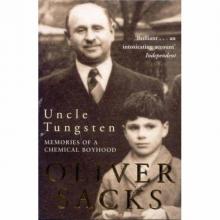 Uncle Tungsten
Uncle Tungsten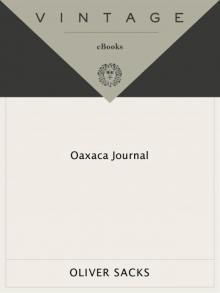 Oaxaca Journal
Oaxaca Journal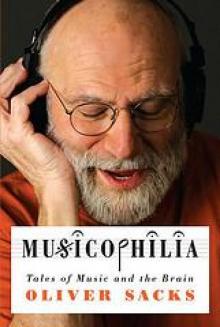 Musicophilia
Musicophilia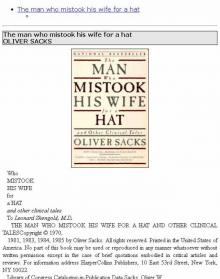 The man who mistook his wife for a hat
The man who mistook his wife for a hat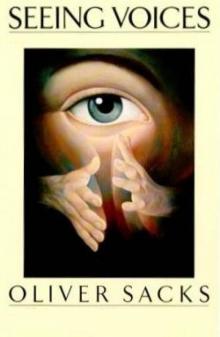 1989 - Seeing Voices
1989 - Seeing Voices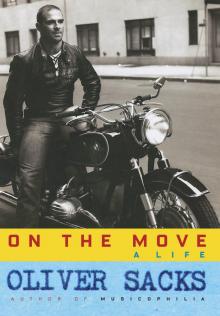 On the Move: A Life
On the Move: A Life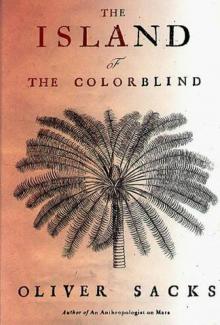 1996 - The Island of the Colorblind
1996 - The Island of the Colorblind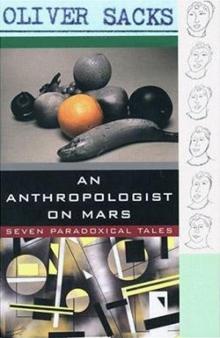 An Anthropologist on Mars: Seven Paradoxical Tales
An Anthropologist on Mars: Seven Paradoxical Tales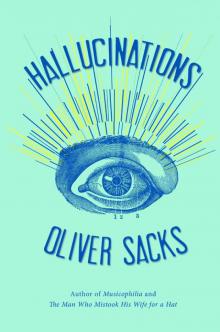 Hallucinations
Hallucinations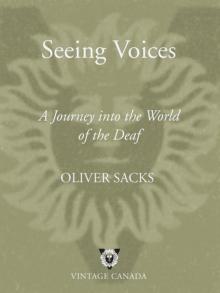 Seeing Voices
Seeing Voices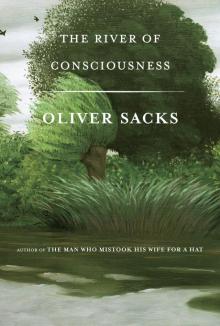 The River of Consciousness
The River of Consciousness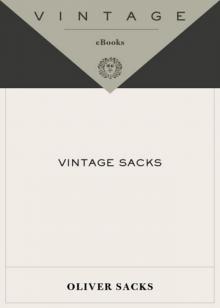 Vintage Sacks
Vintage Sacks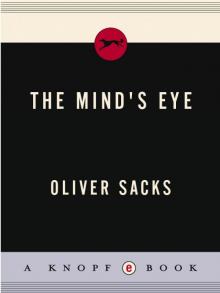 The Mind's Eye
The Mind's Eye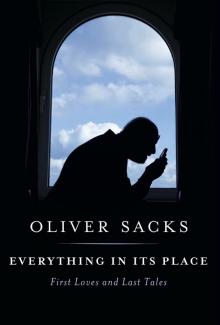 Everything in Its Place
Everything in Its Place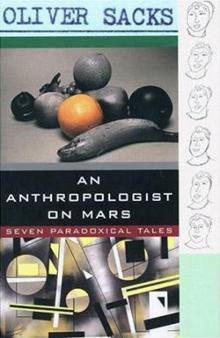 An Anthropologist on Mars (1995)
An Anthropologist on Mars (1995)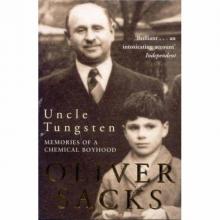 Uncle Tungsten: Memories of a Chemical Boyhood (2001)
Uncle Tungsten: Memories of a Chemical Boyhood (2001)